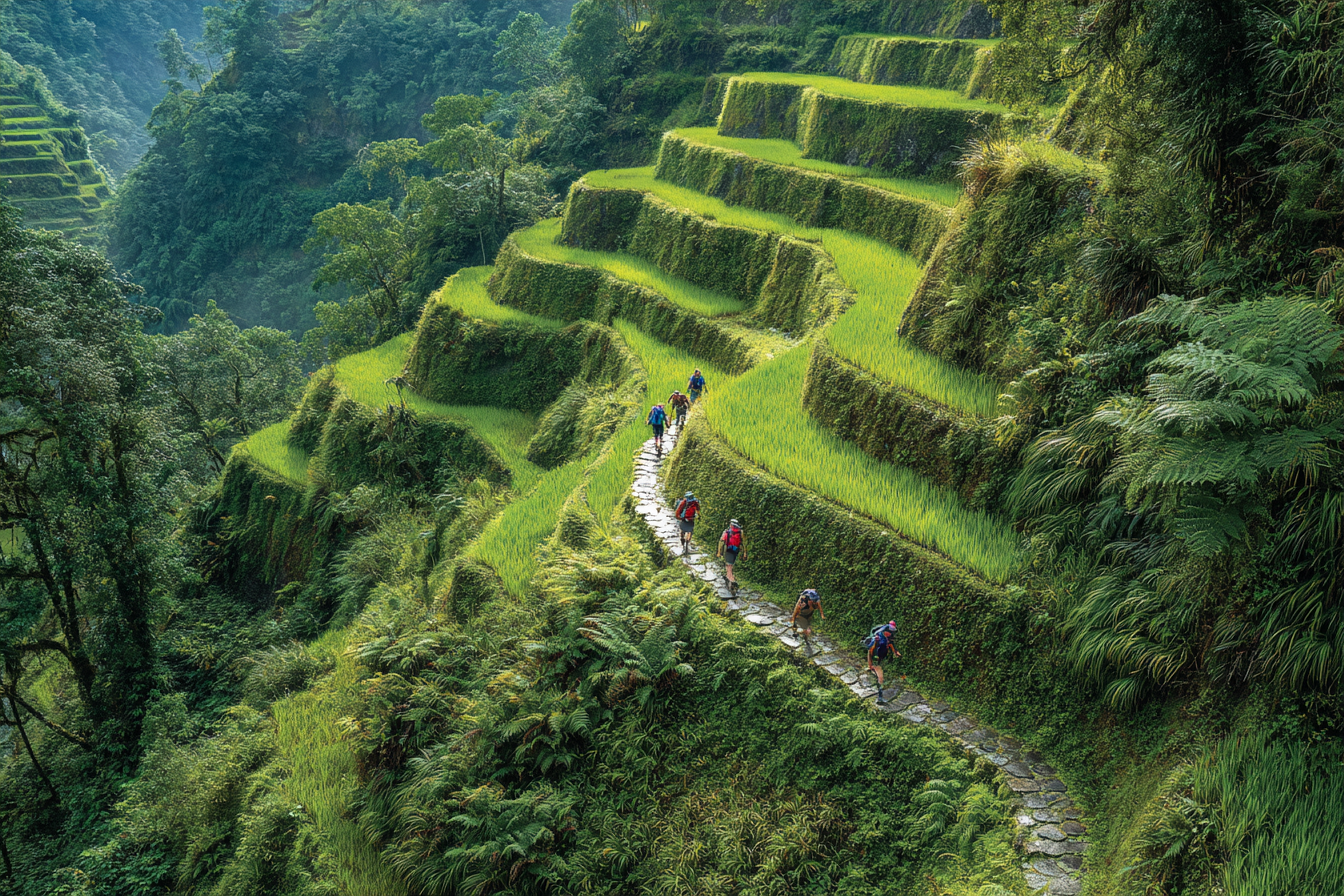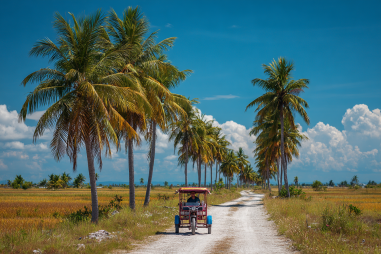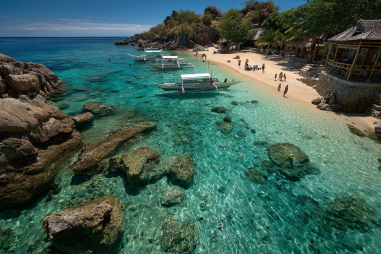Nestled in the mountainous region of the Philippines, Banaue is home to the remarkable 2,000-year-old rice terraces, often hailed as the “Eighth Wonder of the World.” These terraces are not just iconic landmarks but also an integral part of the indigenous Ifugao people’s culture and livelihood. In recent years, eco-tourism has emerged in Banaue as a dynamic approach to preserving both the natural environment and the rich cultural heritage of this area. By promoting sustainable travel practices, Banaue’s eco-tourism offers visitors an authentic experience while fostering environmental stewardship and community development.
What is Eco-Tourism in Banaue?
Eco-tourism in Banaue focuses on responsible travel that minimizes negative impacts on the environment and culture, while contributing to the well-being of local communities. It involves exploring the stunning rice terraces and surrounding landscapes in a way that supports conservation efforts and respects the traditions of the Ifugao people. This type of tourism encourages visitors to learn about the natural ecosystems and cultural practices, fostering a deeper appreciation of the area’s heritage.
In Banaue, eco-tourism includes activities like guided treks through the rice terraces, cultural immersion experiences with local families, and participation in conservation programs. Tour operators and accommodation providers emphasize sustainability, ensuring that practices such as waste reduction, use of eco-friendly materials, and promotion of local products are followed. Ultimately, eco-tourism in Banaue is about creating a travel experience that is enriching, educational, and low-impact.
Environmental Challenges Facing the Rice Terraces
The Banaue rice terraces face several environmental challenges threatening their longevity and ecological balance. One of the primary concerns is the gradual degradation caused by natural factors like soil erosion, landslides, and changes in weather patterns due to climate change. These environmental stressors affect the terraces’ structural stability and the health of the rice paddies.
Additionally, modern agricultural practices and the migration of younger generations to urban centers have led to a decline in traditional farming knowledge and terrace maintenance. The terraces require constant upkeep, including the repair of irrigation canals and the contour walls, which becomes challenging without active local farmers.
Tourism, while beneficial economically, can also strain the fragile ecosystem if not managed sustainably. Increased foot traffic, littering, and construction of unsustainable facilities can harm the terraces and the surrounding forests. This is why eco-tourism initiatives aiming to protect and rehabilitate the rice terraces are so crucial.
Local Community Involvement
The strength of Banaue’s eco-tourism lies largely in the enthusiastic participation and stewardship of the local community. The Ifugao people have a deep connection to their environment and have passed down their agricultural and cultural practices for generations. Their involvement ensures that tourism development aligns with community values and benefits local residents directly.
Many community-based organizations and cooperatives have formed in Banaue to manage eco-tourism activities. These groups often organize cultural demonstrations, such as traditional weaving and dance, and offer homestays where visitors can experience day-to-day village life. Profits from tourism are reinvested into the community, funding education, healthcare, and conservation projects.
This empowerment fosters pride among locals and encourages the preservation of their cultural heritage. It also provides vital economic incentives for them to maintain the rice terraces and natural landscapes rather than abandoning or exploiting them unsustainably.
Eco-Friendly Tours and Accommodations
Travelers looking for eco-conscious options in Banaue can choose from a variety of eco-friendly tours and accommodations designed to reduce environmental footprints. Local tour guides lead small-group hikes through the terraces and forest trails, sharing knowledge about indigenous plants, wildlife, and Ifugao traditions. These tours often include visits to lesser-known villages to distribute tourism’s benefits more evenly.
Accommodations in Banaue increasingly focus on sustainability, with many guesthouses and lodges utilizing solar power, composting toilets, and rainwater harvesting systems. Materials like bamboo, wood, and native thatch are commonly used to create structures that blend naturally into the landscape and minimize resource use. Moreover, these lodgings often serve locally sourced food, supporting nearby farmers and reducing carbon emissions from transportation.
Participation in community-based tourism not only offers a more authentic experience but also ensures that travelers’ presence has a positive impact. Visitors leave with a sense of connection and responsibility to help protect this UNESCO World Heritage site for future generations.
Tips for Travelers to Minimize Impact
To truly support eco-tourism in Banaue and leave a positive footprint, visitors can adopt several mindful practices during their trip:
- Respect local customs and traditions: Engage with the Ifugao community in a respectful manner, ask permission before taking photos, and participate in cultural activities with an open heart.
- Use local guides: Hiring community guides ensures that tourism income stays within the village and that the experience is authentic and educational.
- Practice responsible hiking: Stick to established trails, avoid littering, and carry out all non-biodegradable waste.
- Choose eco-friendly accommodations: Support lodges and homestays that implement sustainable practices like waste minimization, water conservation, and renewable energy use.
- Minimize plastic use: Bring reusable water bottles, bags, and containers to reduce single-use plastics that harm the environment.
- Support local products: Purchase handwoven fabrics, organic food, and souvenirs directly from local artisans and farmers.
- Limit carbon footprint: Consider longer stays to reduce frequent travel emissions and use public transportation or carpooling when possible.
Success Stories and Ongoing Projects
Banaue has seen inspiring success stories as eco-tourism gradually influences conservation and community welfare positively. One notable example is the revitalization of rice terrace farming through organic agriculture initiatives. Collaborations between local farmers and environmental organizations have introduced sustainable farming techniques that boost productivity without harming the soil or water supply.
Another achievement is the establishment of eco-tourism cooperatives that run guesthouses, trekking services, and cultural workshops. These cooperatives provide steady income to members, reduce dependence on external job markets, and promote cultural exchange.
There are also ongoing projects aimed at improving infrastructure with minimal ecological disturbance. These include installing solar lighting in villages, creating waste management programs, and restoring degraded terraces through community-led efforts.
Government partnerships and non-profit organizations continue to support education campaigns about the importance of conservation and responsible tourism. Together, these combined efforts have fostered a sustainable tourism model that other heritage sites might emulate.
Supporting Sustainable Tourism in Banaue
Traveling to Banaue offers a magnificent opportunity to witness one of the world’s greatest engineering and cultural marvels. By engaging in eco-tourism, visitors contribute to the protection and preservation of the rice terraces, helping to maintain their ecological integrity and cultural significance. Supporting local communities through respectful interactions, choosing eco-friendly options, and being mindful of environmental impacts amplifies the positive benefits of tourism.
Banaue’s eco-tourism journey demonstrates how sustainable travel can create a harmonious balance between visitors and host communities while safeguarding natural and cultural treasures. As more travelers embrace this responsible approach, the rice terraces stand a better chance of thriving for generations to come—an enduring testament to human ingenuity and respect for the Earth.







